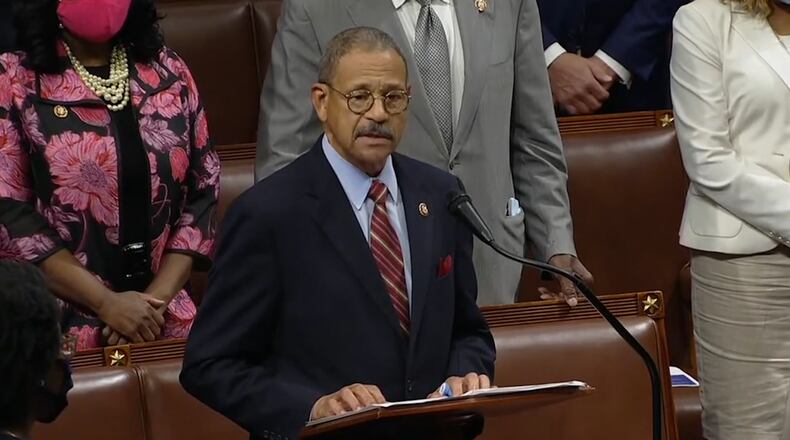U.S. Rep. Sanford Bishop’s membership, green fees and meals at two exclusive golf courses were paid for with campaign funds, a recent U.S. House investigation concluded. The same campaign committee also paid for virtually all the gas that Bishop and his wife put into their vehicles, the report said.
A separate taxpayer-funded account paid for holiday parties for Bishop’s staff over four years, investigators found. Now, the House Committee on Ethics is reviewing the case to determine whether Bishop violated congressional rules or federal laws.
Bishop, a Democrat from Albany who represents the 2nd Congressional District, has since paid back some of the more questionable expenses. His attorney said the congressman also implemented new policies and put a different campaign treasurer in place.
“Representative Bishop acknowledges that mistakes were made by his campaign and that he should have provided better oversight on these matters,” his attorney wrote in its response to the preliminary report. “This is a responsibility he does not take lightly, and he intends to make sure careless errors like this never happen again.”
If found responsible for any breaches, Bishop could face fines, censure or, if Ethics Committee members believe his case is severe, expulsion. The committee can also refer the case to the U.S. Department of Justice or the Federal Election Commission.
The committee in June granted itself an extension of time to review the case, which was the first public indication that an investigation was underway. There is no timeline for when it will release its determinations and recommendations.
The Ethics Committee recently voted to fine U.S. Rep. David Schweikert $50,000 and reprimand him on the House floor after it found that the Arizona Republican had, in part, used campaign funding for personal use and, over a six-year period, misused his member’s representational allowance, public dollars used to operate his offices in Washington and his district.
Bishop is also facing accusations of misusing his MRA.
From 2015 through 2018, he used the account to pay $16,087.87 for annual holiday parties that were not widely advertised although he told investigators that constituents were welcome. Bishop’s staff and that of his wife, Vivian Creighton Bishop, the elected clerk of municipal court in Columbus, were each invited to bring a “plus one.”
The Office of Congressional Ethics, an independent, nonpartisan board charged with reviewing allegations of misconduct, determined that the Bishops requested vendors to label invoices “constituent meetings” although the annual event included dinner, live entertainment and dancing.
Bishop recently paid back the entire amount.
First elected in 1992, Bishop became the senior-most member of the Georgia delegation after U.S. Rep. John Lewis died last month. He has a Republican opponent in November but is the heavy favorite to win another term in the 2nd District.
The OCE began looking into the Sanford Bishop for Congress campaign committee’s spending late last year. In January, the board adopted a preliminary report that said questionable spending generally fell under two categories: fuel and golf.
According to campaign finance records filed with the FEC, the committee paid at least $10,049.97 in charges to fuel cars used by Bishop, his wife or, on at least one occasion, his daughter between October 2017 and June 2019.
A closer look revealed that about $2,500 in charges were actually personal checks that the campaign’s treasurer at the time wrote as reimbursements after some funds appeared to have been converted for her personal use. Bishop said the treasurer’s failing physical health may have been a contributing factor.
Much of the money, however, went to pay off the monthly statement for a gas card the Bishops used to fill up their tanks. Yet, they didn’t keep mileage logs to justify how much of their driving was related to campaign or political activities.
“He told the OCE he is engaged in political discussions wherever he travels, meaning that in his view, a trip to the grocery store, Walmart, golf course, or other venue that may appear personal on its face, almost always entails some political component,” the report said.
The golf charges mainly center on two facilities: Green Island Country Club in Columbus and Stonebridge Golf and Country Club in Albany. The campaign account paid for Bishop’s monthly membership fees, guest green charges, meals and more until the practice was pointed out as problematic by the OCE.
From May 2014 through September 2019, the campaign committee paid $49,564.08 in expenses that the OCE considers personal in nature, according to the report. That is separate from legitimate campaign expenditures for annual golf fundraisers that Bishop held at these facilities.
Investigators also found documentation that the campaign committee paid for a golfing trip to a resort near Atlanta that Bishop said doubled as a strategy session with three friends who also volunteered with his campaign. The campaign committee also paid for expenses while the Bishops vacationed over the holidays in Hilton Head, South Carolina, and a $660 withdrawal was used to pay for his granddaughter’s school tuition.
The congressman said the wrong account card was used at an ATM, and he reimbursed the money.
Bishop’s attorney, Brian G. Svoboda of the Perkins Coie firm, outlined additional steps the congressman has taken to acknowledge and rectify the issues. That includes hiring an outside consultant to prepare and file future FEC reports and amending previous ones with incomplete or incorrect information.
The new campaign treasurer, who is not named in the report but listed in FEC filings as Charonda Huff, was among the first to speak up about the shoddy bookkeeping, the report said.
About the Author
Keep Reading
The Latest
Featured




